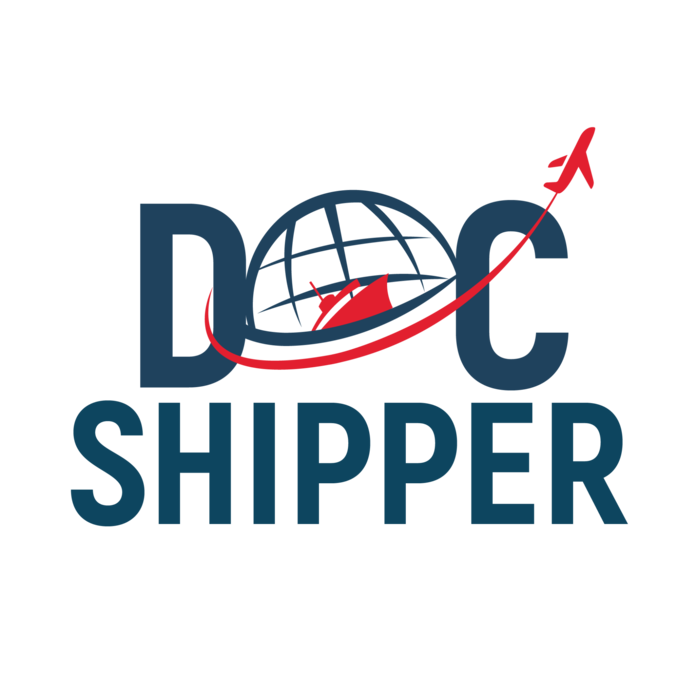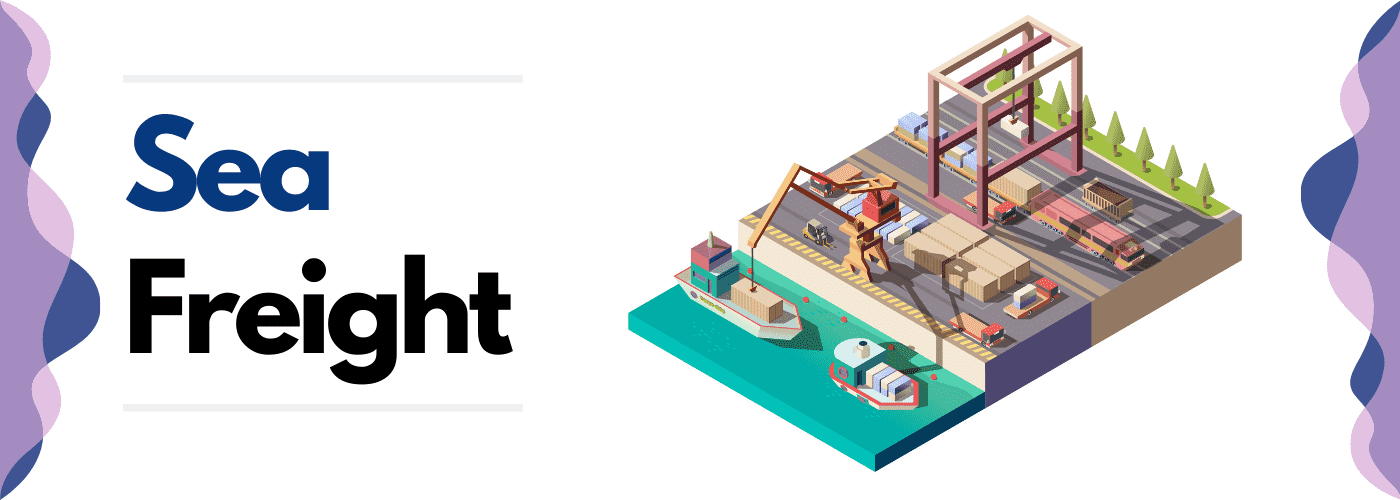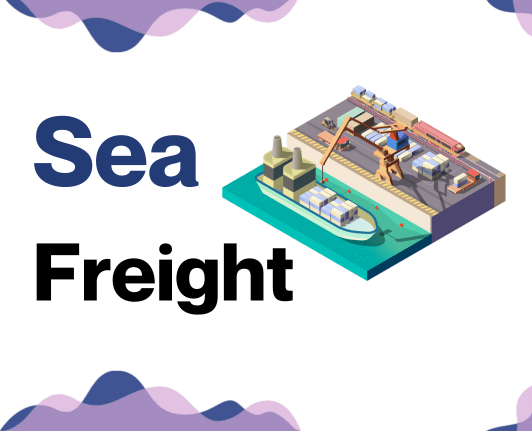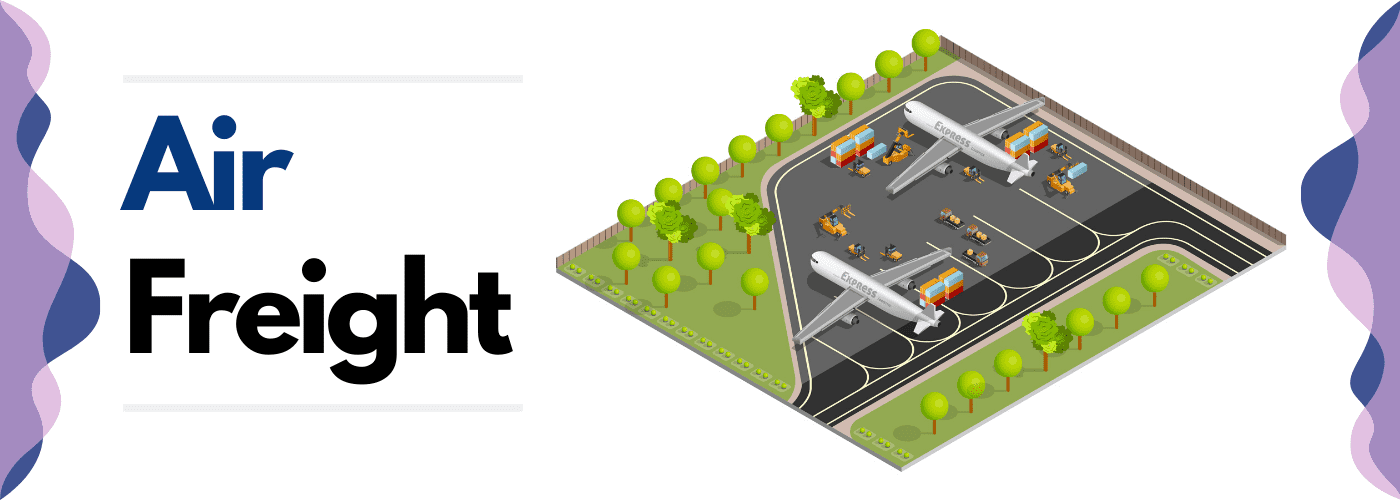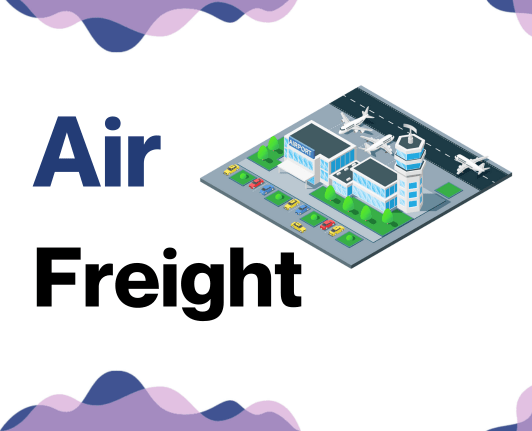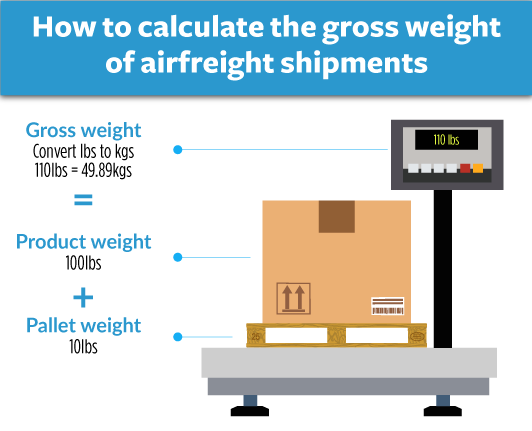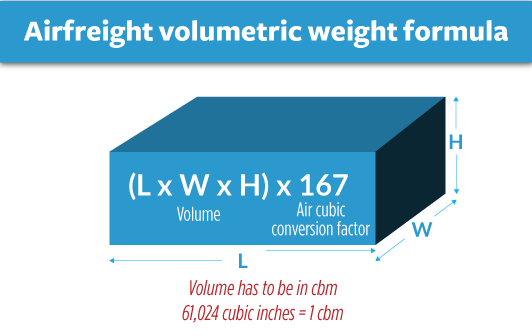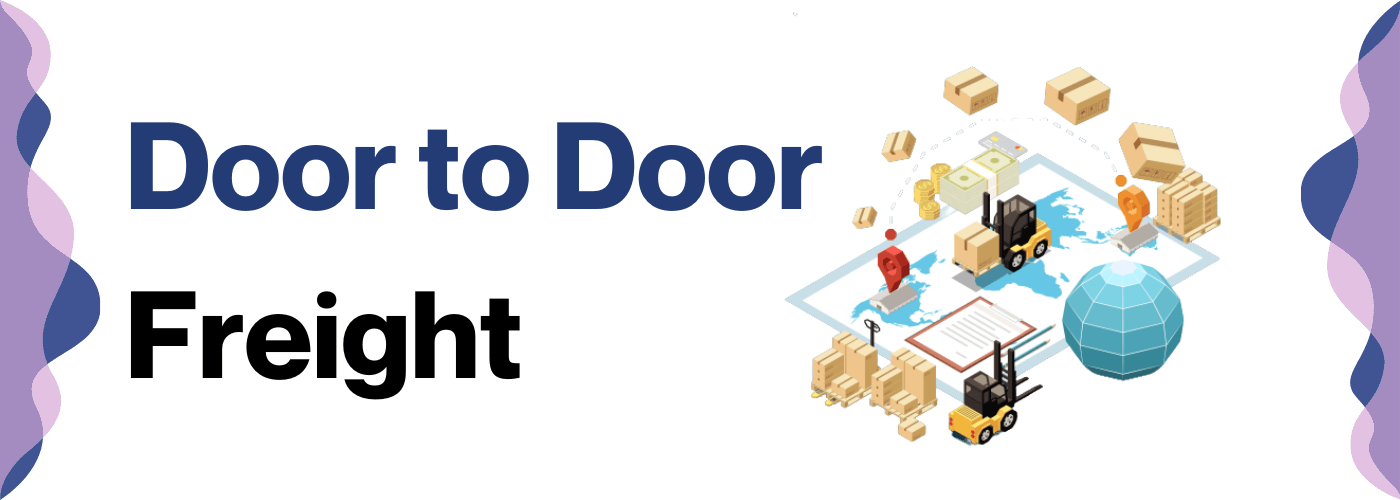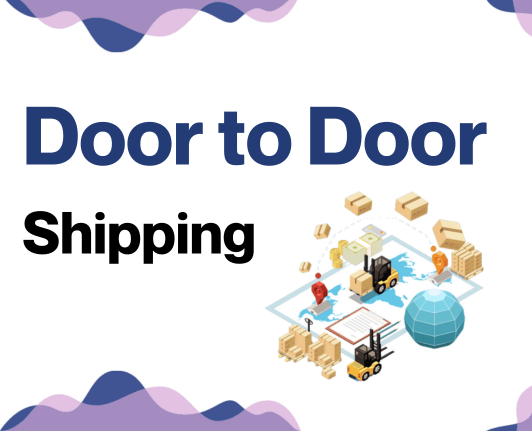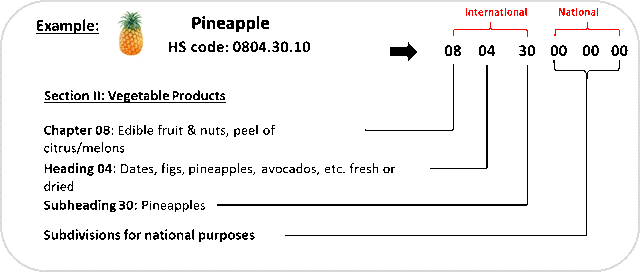Ever tried shipping something from the UK to Iraq and felt like you were lost in a desert? The complexities of understanding international shipping rates, transit times, and customs regulations can often be as challenging as crossing the Sahara without a map! This destination guide is designed as an oasis, inviting you to delve into the world of importing and exporting goods between the UK and Iraq. Here, you'll unravel the enigma of freight options—be it air, sea, road or rail—grasp the practicalities of customs clearance, understand the intricacies of duties and taxes, and gather tailored advice for your business. If the process still feels overwhelming, let DocShipper handle it for you! As an international freight forwarder, we turn your shipping challenges into real success stories, giving you peace of mind and letting you focus on your primary business.
Table of Contents
Which are the different modes of transportation between UK and Iraq?
Choosing the right transport method between the UK and Iraq can feel like a board game strategy; it's all about calculated moves. Factor in the twisty 5,000 km journey bridging Europe and Middle East, air freight stands out for its speed, while sea routes score in bulk transport. But it really boils down to your unique cargo needs. Is it time-sensitive? Does volume matter? Understanding these key points can help you unlock the right move in this game of logistics. Remember, the most efficient route isn't always the most obvious one. Choose smart, and win your shipping game!
How can DocShipper help?
Sorting out shipping from the UK to Iraq? Let DocShipper smooth the path for you. Our team handles transportation, customs procedures, duties, and more, all in record time to keep your business on track. Got queries? Our consultants are always ready to assist. Reach out now for a free estimate within 24 hours.
DocShipper Tip: Ocean freight might be the best solution for you if:
- You're dealing with large quantities or oversized items. Sea freight offers a budget-friendly way to maximize space, a particularly useful option given the UK's extensive port network.
- Your shipment isn't on a tight schedule. Ocean transport typically takes longer than air or rail, but it offers reliability.
- Your supply chain involves key ports, allowing you to take advantage of a wide-reaching network of sea lanes.
Sea freight between UK and Iraq
UK and Iraq, despite being geographically distant, are connected by a robust network of sea routes. Key cargo ports like Basra in Iraq and Felixstowe in the UK serve as vital cogs in their booming trade relationship. The slower transit times of ocean shipping are offset by its capacity to move high-volume goods very cost-effectively. This makes it a lifeline for businesses that hinge on the steady flow of bulk shipments. However, the route is not without its challenges.
From customs clearance to packing specifications, shippers often grapple with a maze of complex processes and slip-ups occur frequently when shipping between these two countries. Misclassifications, an oversight in paperwork, or not knowing the local regulations, can lead to costly delays or even penalties. But there's a silver lining: By understanding the best practices and adhering strictly to shipping specifications, these potential headaches can be significantly alleviated. In this segment, we uncover these key aspects of ocean shipping between the UK and Iraq, providing you with actionable insight. Enjoy the journey - the sea might be rough, but navigating these waters is far from impossible.
Main shipping ports in UK
Port of London:
Location and Volume: Situated on the River Thames, the Port of London is not only a key hub in the UK’s trade pipeline—it’s also among the busiest ports in the country. It has a shipping volume of over 50 million tonnes annually.
Key Trading Partners and Strategic Importance: Engaging in trade with over 80 countries worldwide, critical partners include China, Germany, Spain, and the Netherlands. The port's strategic position on the Thames provides direct access to mainland UK, with its broad range of cargoes including vehicles, forest products, project cargo, and bulk commodities.
Context for Businesses: If your enterprise requires the import and export of diverse types of cargoes, including container traffic and large goods, the Port of London's multifaceted approach could be an ideal fit for your logistics chain, given its extensive versatility.
Port of Southampton:
Location and Volume: Located in the South of England, the Port of Southampton is crucial for the UK’s passenger, vehicle, and container markets. It handles around one million TEUs (twenty-foot equivalent units) each year.
Key Trading Partners and Strategic Importance: It maintains significant trading connections, particularly with Far Eastern markets, including China and Singapore. Southampton is regarded as the UK's number one port for automotive trade, processing approximately 900,000 vehicles each year.
Context for Businesses: If your business primarily deals with the Far East, and your operations involve vehicles and containers, the Port of Southampton is likely to be a linchpin in your shipping strategy.
Port of Felixstowe:
Location and Volume: Based in the East of England, the Port of Felixstowe is the busiest container port in the UK, with a shipping volume of over 4 million TEUs annually.
Key Trading Partners and Strategic Importance: The port's primary trading partners include China, other parts of Asia, the Americas, and Europe. The Port of Felixstowe also operates two rail terminals, further enhancing its connectivity to domestic markets.
Context for Businesses: If your company trades heavily with Asia and depends on containers, the Port of Felixstowe would likely be a vital part of your logistics, given its high volume capacity and rail connections.
Port of Liverpool:
Location and Volume: Found in the northwest of England, the Port of Liverpool is fundamental to the country’s bulk and container trade, handling over 32 million tonnes of cargo annually.
Key Trading Partners and Strategic Importance: The Port of Liverpool's key trading partners are North America and parts of Europe. Occupying a strategic position, it offers superb connectivity to Ireland and is a major import point for fresh produce.
Context for Businesses: If your business trades with North America, Ireland, or requires a gateway for fresh produce, the Port of Liverpool might serve as a critical piece of your logistics puzzle given its connectivity and specialist facilities.
Port of Grimsby:
Location and Volume: Positioned on the East Coast of Northern England, the Port of Grimsby is essential for the country’s automotive and energy sectors. It handles more than 500,000 vehicles each year.
Key Trading Partners and Strategic Importance: Its significant trading associates incorporate EU nations, with an emphasis on automotive and renewable energy sectors. The port also provides operational and maintenance bases for the offshore wind energy sector.
Context for Businesses: If your company is in the green energy or automotive sector, the Port of Grimsby is likely to fit into your shipping regime due to its focus on these industries.
Port of Dover:
Location and Volume: Nestled in the southeast of England, the Port of Dover is Europe’s busiest ferry port with more than 2.5 million trucks, 2 million cars, and up to 16 million passengers passing through annually.
Key Trading Partners and Strategic Importance: The port's essential trading partners include neighboring EU nations, with the bulk of trade made up of vehicles and passengers. Its strategic position ensures it’s a leading gateway between the UK and the continent.
Context for Businesses: Your business might count on the Port of Dover if you need to rapidly move people, cars or goods to and from mainland Europe due to its ferry operations and strategic location.
Main shipping ports in Iraq
Port of Umm Qasr:
Location and Volume: The Port of Umm Qasr is Iraq's largest seaport, located in Basra, near Kuwait's border. Endowed with a shipping volume of over 10 million tons per year.
Key Trading Partners and Strategic Importance: This port serves as a gateway to multiple aspirations with the main trading partners being India, United Arab Emirates, and China. Known for being Iraq's most important naval outlet, it houses Iraqi navy bases and plays an important role in serving the country's oil industry.
Context for Businesses: Should you aspire to tap into the Middle Eastern markets and especially the oil and non-oil industry, the Port of Umm Qasr could potentially play a pivotal role in your strategy due to its commanding position and access to essential oil reserves.
Al Maqal Port:
Location and Volume: The Al Maqal Port is situated along the Shatt Al Arab river in Basra. Though smaller than Umm Qasr, it still accounts for a fair share of Iraq's shipping volume and operates largely as a port for smaller vessels.
Key Trading Partners and Strategic Importance: Regional trade with nearby Gulf countries makes up the majority of the port's business, particularly Iran, due to its proximity. The port's location on a navigable river also makes it an important strategic asset.
Context for Businesses: If your shipping strategy involves smaller volumes and is targeting Gulf markets, Al Maqal Port might make an excellent staging point for your goods due to its well-connected local network.
Khor Al Zubair Port:
Location and Volume: Another port in the Basra governorate, the Khor Al Zubair Port is unique as it's primarily used for industrial shipping, processing millions of tons annually.
Key Trading Partners and Strategic Importance: Like Umm Qasr, India, the UAE, and China are major trade partners but Khor Al Zubair is notably home to several industry-heavy zones including a large petrochemical facility.
Context for Businesses: If your business belongs to the industrial sector, particularly petrochemicals, Khor Al Zubair might be your destination of choice considering the specialized infrastructure it offers.
Port of Faw:
Location and Volume: The proposed Port of Faw will be one of the largest in the world upon completion — positioned at the mouth of the Shatt Al Arab waterway.
Key Trading Partners and Strategic Importance: With a pan-Asian development strategy in place, its strategic connections will be crucial in the trading network of the region.
Context for Businesses: If you're looking to establish long-term trading ties in Asia, keep an eye on the Port of Faw. It's primed to become a massively influential player in the maritime shipping world.
Should I choose FCL or LCL when shipping between UK and Iraq?
Choosing between Full Container Load (FCL) and Less than Container Load (LCL), or consolidation, can make or break your shipping game from the UK to Iraq. This decision swings the scales for cost, delivery times, and the overall success of your transportation process. In our quest to help you nail it right, we'll dissect these options, pulling out key characteristics to arm you with the knowledge you need to make the best decision. So, let's set sail and dive into the world of sea freight, where every choice adds up to your ultimate business success.
LCL: Less than Container Load
Definition:
Less than Container Load (LCL) shipment is a method of shipping smaller volumes of goods that don't require a full container. By sharing container space with others, you achieve freight consolidation, cutting down on costs.
When to Use:
LCL freight becomes the ideal choice when your cargo volume falls below 13/14/15 Cubic Meters (CBM). For businesses with lower shipment volumes, this offers flexibility and avoids the financial strain of paying for unused container space.
Example:
Consider a medium-sized business in Manchester looking to send an initial batch of traditionally crafted textiles to a new distributor in Baghdad. The batch size is only 12 CBM, hardly enough to justify a full container. Going with an LCL shipment allows this business to get their products to Iraq without having to wait until they have enough goods for a full container.
Cost Implications:
When weighing LCL freight costs, you only pay for the space your cargo occupies, making it a cost-effective solution for smaller shipments. However, bear in mind that LCL shipment services may include extra costs such as deconsolidation fees at the destination. Despite this, the overall cost often remains more favourable compared to a half-filled container.
FCL: Full Container Load
Definition:
FCL, or Full Container Load, refers to an exclusive sea freight service in which a single business books an entire container - either a 20'ft or 40'ft container- for their cargo. An FCL container offers complete control over the cargo from origin to destination.
When to Use:
FCL shipping is advisable when your cargo expands beyond 13/14/15 CBM. The benefits are mainly twofold: cost-efficacy for high volume shipments and increased safety. FCL proves to be cheaper per unit as the volume of your shipment increases. Besides, since your cargo is the only item in the container, it remains sealed until it reaches the destination, reducing the risks of damage or loss.
Example:
Consider a UK-based manufacturer exporting machinery parts to Iraq. The total volume of the parts exceeds 15 CBM and includes some fragile items. FCL would be the optimal choice here, as it prevents the cargo from being mishandled during transshipment.
Cost Implications:
Although the initial FCL shipping quote may appear high, it becomes significantly cost-effective when dealing with larger shipments. An entire container might cost less than multiple smaller shipments. It's prudent to compare the quote against your volume of goods to determine whether FCL aligns with your budget.
Unlock hassle-free shipping
Are you torn between consolidation and a full container shipment from the UK to Iraq? Allow DocShipper to lighten the load. Our ocean freight experts excel in identifying the most efficient and cost-effective method for your cargo. Your business size, shipping time frame, cargo volume, and budget are all considered in our analysis. Start off on the right foot - connect with DocShipper’s team for a free, no-obligation shipping estimate today.
How long does sea freight take between UK and Iraq?
The average shipping time between the UK and Iraq via sea freight can vary significantly. Several factors such as the specific ports used, the weight of the cargo, and the nature of the goods, can influence the transit time. For accurate and tailored shipment timelines, consider reaching out to a multinational freight forwarder like DocShipper.
UK to Iraq Sea Freight Transit Times
| UK Ports | Iraq Ports | Average Shipping Time (Days) |
| London | Umm Qasr | 26 |
| Southampton | Al Maqal | 25 |
| Felixstowe | Khor Al Zubair | 25 |
| Liverpool | Faw | 26 |
*This table represents the average transit times for sea freight between the main ports in both the UK and Iraq. Factors like weather conditions and customs clearance could cause fluctuations in actual transit times.
How much does it cost to ship a container between UK and Iraq?
Estimating the shipping cost of a container between the UK and Iraq can be a complex task, with rates per CBM ranging vastly. These ocean freight rates greatly depend on factors such as the Point of Loading, Point of Destination, the selected carrier, the character of goods, and current market dynamics. Hence, we cannot propose an absolute price at this point. However, fear not, our seasoned shipping specialists are equipped to guide you through. We diligently work with you on a case-by-case basis, ensuring tailor-made solutions best suited to your needs within this dynamic schema. Trust us to provide you with the most competitive, personalized rates in the market.
Special transportation services
Out of Gauge (OOG) Container
Definition: An OOG container is an oversized shipping container that exceeds standard container dimensions. It's designed for items that can't fit in regular containers due to their size.
Suitable for: Any large, irregularly shaped, or out of gauge cargo that doesn't fit in standard containers.
Examples: Construction equipment, windmill propellers, heavy machinery, larger vehicle parts.
Why it might be the best choice for you: If you have large machinery or goods of uneven dimensions, this method offers flexibility in transporting these goods efficiently and securely between the UK and Iraq.
Break Bulk
Definition: Break Bulk cargo consists of individual items loaded separately onto the vessel and not in a container, essentially a loose cargo load.
Suitable for: Larger irregularly shaped items which can't be containerized.
Examples: Large construction materials, timber, metal beams, heavy equipment.
Why it might be the best choice for you: Businesses dealing with large non-containerizable items may find this option ideal as it allows more flexibility for the type and size of items being shipped.
Dry Bulk
Definition: Dry Bulk shipping involves the transport of homogenous bulk cargoes in large quantities without packaging.
Suitable for: Commodities like grains, coal, or minerals that can be loaded directly into the ship's cargo holds.
Examples: Wheat, sugar, coal, iron ore.
Why it might be the best choice for you: If your business entails delivering large quantities of raw materials between the UK and Iraq, Dry Bulk shipping can provide an economical and efficient solution.
Roll-on/Roll-off (Ro-Ro)
Definition: Ro-ro refers to vessels designed to carry wheeled cargo such as cars, trucks, trailers, which are driven on and off the ship.
Suitable for: All types of motorized, rolling and track-propelled equipment.
Examples: Cars, buses, trucks, tractors, trailers, rail cars.
Why it might be the best choice for you: Businesses that need to transport vehicles or heavy rolling machinery may find this method ideal due to its simplicity and speed in loading and unloading.
Reefer Containers
Definition: Reefer Containers or refrigerated containers are used to transport goods that need to be kept at a specific temperature.
Suitable for: Perishable goods such as food and pharmaceuticals.
Examples: Fresh fruits, vegetables, meat, dairy products, medicinal supplies.
Why it might be the best choice for you: Perfect for businesses dealing with perishable goods since these containers can regulate temperature, ensuring the freshness and quality of your products during transit.
Thanks for learning about the different sea freight shipping options between the UK and Iraq. To figure out which method suits your shipping needs best, you can reach out to us at DocShipper. Our experienced team is always ready to help you choose the most effective and cost-efficient shipping option. Contact us now for a free shipping quote in less than 24 hours.
DocShipper Tip: Air freight might be the best solution for you if:
- You're facing tight deadlines or need rapid delivery. Air freight is your quickest option, which aligns well with the fast-paced business environment.
- Your shipment is relatively small, under 2 CBM. Air freight is ideal for these more compact loads.
- Your cargo's destination isn't easily reached via sea or rail. This makes air freight a viable option, especially given the extensive network of airports available.
Air freight between UK and Iraq
Within the world of international trade, speed and reliability reign supreme, and nowhere is this more relevant than in air freight between the UK and Iraq. Here, small but valuable parcels - think pharmaceuticals or electronics - can swiftly skip over seas and continents within a matter of hours. It's a fast-paced courier race where efficiency is king and urgency, its queen. But, the domain of air freight isn't without its pitfalls.
Far too often, businesses stumble over the hurdle of cost estimation - a crucial step where accurate weight calculations hold the key to avoiding nasty surprises. Just picture sending your product on a long-haul flight and then finding out it needs two seats instead of one. Ouch! And that's just the tip of the iceberg. There's a whole labyrinth of best practices shippers miss out on, causing their costs to unnecessarily soar higher than the airplanes they're sending out. Let's save those company dollars and explore these aspects more closely.
Air Cargo vs Express Air Freight: How should I ship?
Choosing between dispatching your shipment on an airline with other freights (aka 'air cargo') vs flying them on a dedicated plane solely for your shipment (aka 'express air freight') isn't just a coin toss between UK and Iraq. Understanding your business's specific needs, urgency, budget constraints, and examining the pros and cons of these options helps turn the skies in your favour. Let's help you sky-rocket your decision-making process.
Should I choose Air Cargo between UK and Iraq?
Choosing air cargo for freight between the UK and Iraq can be a wise move, given its cost-effectiveness and reliability. Airlines like British Airways and Iraqi Airways offer consistent services, their fixed schedules ensuring longer transit times but excellent service reliability. Remember, budget wise, air freight becomes more attractive from 100/150 kg (220/330 lbs) of cargo onwards. Visit the official British Airways and Iraqi Airways websites to explore more about their freight services.
Should I choose Express Air Freight between UK and Iraq?
Express air freight leverages dedicated cargo planes, sans passengers, to transport your smaller cargoes. Offering advantages like speed and security, it’s particularly effective for consignments under 1 CBM or around 100-150 kg (220-330 lbs). If speed is critical for your UK-Iraq shipments, firms like FedEx, UPS, and DHL specialize in this service, ensuring quick, hassle-free deliveries. So, if you’re shipping lighter, smaller goods, this could be an efficient, time-saving choice for you.
Main international airports in UK
Heathrow Airport
Cargo Volume: Over 1.7 million metric tonnes passed through in 2019.
Key Trading Partners: Major trading goods come from and go to countries such as USA, China, and India.
Strategic Importance: Heathrow is the busiest airport in the UK and the main hub for British Airways.
Notable Features: Exceptional handling capacity, with two dedicated Cargo villages: Central and West.
For Your Business: Convenient, reliable, and vast network coverage makes Heathrow a practical choice for cargo transportation to and from the UK.
Manchester Airport
Cargo Volume: Manchester handled more than 100,000 tonnes of import and export freight in 2019.
Key Trading Partners: Primarily routes to the USA, Middle East, and Asia.
Strategic Importance: Second largest cargo airport in the UK, providing an alternative shipping route to the congested southern airports.
Notable Features: Houses the World Freight Terminal which operates around the clock, and accommodates all aircraft types.
For Your Business: A potentially smoother and efficient option if your goods' final destination is in the north of England or Scotland.
Stansted Airport
Cargo Volume: Around 250,000 tonnes handled in 2019, with projections of growth.
Key Trading Partners: Numerous destinations across Europe, USA and the Middle East.
Strategic Importance: Fast growing cargo airport, home to numerous freight airlines.
Notable Features: Renowned cargo terminal dedicated to efficient handling of all shapes and sizes of cargo.
For Your Business: A rapidly-growing hub that could provide access to a diverse range of global markets.
East Midlands Airport
Cargo Volume: Handled more than 320,000 tonnes in 2019, making it the busiest pure cargo airport in the UK.
Key Trading Partners: Works with regions worldwide, including Asia, America, and Europe.
Strategic Importance: Recognized as the central hub for DHL UK and UPS, and a major hub for Royal Mail.
Notable Features: Enormous cargo handling capacities and 24-hour operation.
For Your Business: Great choice if you're looking for speed, security, and a hub centered on handling express courier freight.
Glasgow Prestwick Airport
Cargo Volume: Over 38,000 tonnes of cargo passed through in 2019.
Key Trading Partners: Regular freight connections to America and Europe.
Strategic Importance: It is Scotland's largest commercial airfield with a variety of cargo operators.
Notable Features: It offers excellent transport links, large aircraft parking areas, and no slot restrictions.
For Your Business: If space and accessibility are part of your cargo needs, this Scottish airport offers plenty.
Main international airports in Iraq
Baghdad International Airport
Cargo Volume: Handles 175,000 metric tonnes of cargo annually.
Key Trading Partners: Key trading partners are Iran, China, Turkey, and India.
Strategic Importance: This airport is strategically positioned in the capital city, making it easily accessible to a significant portion of Iraq's population. It serves as the primary entry and departure point for foreign trade.
Notable Features: It has 5 cargo bays capable of accommodating wide-bodied aircraft and a dedicated freight terminal to enable efficient cargo operations.
For Your Business: With good air connectivity and close proximity to the capital, basing your air freight operations here can provide rapid and convenient distribution to the entire region.
Al Najaf International Airport
Cargo Volume: Processes more than 50,000 metric tonnes of cargo annually.
Key Trading Partners: Primary trading partners are Syria, Saudi Arabia, Jordan, United Arab Emirates, and Kuwait.
Strategic Importance: Positioned in the southern region of Iraq, it plays a key role in enhancing foreign trade with neighbouring gulf countries.
Notable Features: It features a dedicated terminal for cargo handling and the ability to handle wide-bodied, high-capacity aircraft.
For Your Business: Its gulf-connectivity and cargo handling capacity make it suitable for businesses with high-volume shipments, especially pertinent to trade with GCC countries.
Erbil International Airport
Cargo Volume: Accounts for 120,000 metric tonnes of cargo annually.
Key Trading Partners: Turkey, Germany, United Arab Emirates, Iran, and Syria.
Strategic Importance: Established in Northern Iraq, it has strategic importance for business with Turkey and the Kurdistan region.
Notable Features: Has a dedicated cargo terminal and the ability to handle large aircraft. It also boasts of the longest runway in Iraq.
For Your Business: Businesses dealing in Turkey and the Kurdistan region can benefit from intensive air connectivity and easy access to Northern Iraq's commerce centers.
Basra International Airport
Cargo Volume: Annually manages about 60,000 metric tonnes of cargo.
Key Trading Partners: UAE, India, China, Turkey, and Saudi Arabia.
Strategic Importance: Situated near the Arab Gulf and key shipping lanes, its strategic location helps to facilitate trade with Asian and Middle Eastern countries.
Notable Features: It has a dedicated modern cargo terminal designed to expedite the process of unloading and dispatching goods.
For Your Business: It could be a good fit for businesses focused on trade with Gulf countries and Asia, sees significant freight passages to these regions offering reduced delivery times.
Sulaimaniyah International Airport
Cargo Volume: Manages roughly 45,000 metric tonnes of cargo per year.
Key Trading Partners: Turkey, Iran, UAE, Germany, and China.
Strategic Importance: Located in North-Eastern Iraq, it serves as a crucial port for goods coming to and from Turkey and Iran.
Notable Features: It has recently expanded its cargo handling facilities to improve service and efficiency.
For Your Business: Opt for this airport if your business deals extensively with Turkey and Iranian sectors, given its excellent air routes to these countries.
How long does air freight take between UK and Iraq?
The transit time of air freight between the UK and Iraq typically ranges from 1-3 days. However, this can fluctuate depending on various factors including the specific airports in question, the weight of the cargo, and the nature of the goods you're shipping. For the most accurate timescales, it is well-advised to consult a freight forwarder like DocShipper.
How much does it cost to ship a parcel between UK and Iraq with air freight?
Average shipping costs for air freight parcels between the UK and Iraq generally range from $3 to $8 per kilogram. However, a multitude of aspects contribute to the final quotation. Factors such as the distance from the departure and arrival airports, the size and weight of the shipment, and the nature of the goods can all impact the cost. Rest assured, our dedicated team is committed to understanding your unique needs and providing highly competitive rates tailored to your specific case. Contact us and receive a free, no-obligation quote within 24 hours.
What is the difference between volumetric and gross weight?
Gross weight refers to the actual weight of your shipment, incorporating everything, including packaging. Volumetric weight, also known as dimensional weight, reflects the space your package occupies on an aircraft, not the actual weight.
To calculate the gross weight in Air cargo and Express Air Freight services, you simply weigh your entire shipment including its packaging, ideally on an accurate industrial scale. If your package weighs 60 kg, it'd be about 132 lbs.
Volumetric weight, meanwhile, isn’t as straightforward. In air cargo, it's computed by multiplying length x width x height in centimeters of each parcel of the shipment, then dividing it by 6000. In Express Air Freight, the same operation is done but divided by 5000. Let's say your shipment measures 160cm x 120cm x 150cm. In air cargo, its volumetric weight is 48 kg (105 lbs) while in Express Air Freight, it's 57.6 kg (127 lbs).
This matters because freight charges hinge on whether the gross or volumetric weight is higher. This prevents carriers from losing money on large yet light packages. You'll be billed on 60 kg in our example, as it's the higher of the two in Air Cargo, but in Express Air Freight, you'd be billed on 57.6 kg.
DocShipper tip: Door to Door might be the best solution for you if:
- You prioritize ease and a hassle-free shipping experience. Door-to-door services manage the entire process, from collection to final delivery.
- You appreciate the efficiency of having one dedicated contact. With door-to-door, a single agent is responsible for overseeing all elements of your shipment.
- You want to limit the number of times your cargo is transferred. Door-to-door services minimize the switches between various transport methods, lowering the chances of damage or loss.
Door to door between UK and Iraq
Delving into the nitty-gritty of Door to Door shipping, we're shedding light on the game-changer in international freight forwarding. Imagine, your goods whisked away from your UK doorstep and effortlessly delivered to a specified location in Iraq. It's all about convenience, efficiency, and speed, lightening up your logistics load. Ready to uncover more? Let's dive in!
Overview – Door to Door
Tackling international shipping between the UK and Iraq can feel like plunging into a maze of customs regulations and transportation options. Door-to-door shipping is your lifeline - a seamless process from pickup to delivery, taking the logistics hassle off your plate. While it's generally more expensive, the stress-free experience and time saved make it a preferred choice for DocShipper's clients. Be aware, despite its conveniences, you'll have less control over individual shipping stages, which may not suit all. Remember, each business has unique needs - finding the ideal balance is key.
Why should I use a Door to Door service between UK and Iraq?
Why grapple with the shipping nightmares when Door to Door service from the UK to Iraq can rescue you? Here we delve into five compelling reasons why this might be your knight in shining armor.
1. Best Stress-Buster: Mega mix-ups in mix-ups? Breathe out. Goods pick-up can be the thriller where you're the damsel in distress. The Door to Door service swoops in, wrangling goods right from the origin and loading them onto the transport. Basically, they play fetch, and you play relaxed boss.
2. Swift Delivery: Urgent shipments can tick-tock like a time bomb under your desk. Leverage the Door to Door hero to ensure a timely delivery, diffusing panic and boosting your efficiency, just in the nick of time!
3. Specialized Cavalry: Every knight has his trusty steed. Complex or sensitive cargo? Exotic or ridiculously sized loads? Challenge accepted! These services often come equipped with dedicated personnel trained to handle your cargo with the utmost care.
4. Convenience King: Imagine managing trucking from here to Nimrud. Tiring, right? This service, however, smoothens it all out, handling trucking until the cargo reaches the final destination. So, you can simply lean back and witness the cargo's epic journey without breaking a sweat.
5. One-Stop Shop: Time to bid adieu to multiple contacts, endless tabs, and messy spreadsheets. This service fast-tracks thorny tasks – transport arrangements, customs clearance, etc., all wrapped in a neat little package, just for you.
So, ready to say yes to a shipping scenario where you're not pulling your hair out? Door to Door service might just be your new best mate!
DocShipper – Door to Door specialist between UK and Iraq
Streamline your shipping needs from the UK to Iraq with DocShipper. Entrust us with the responsibility of your goods and rest easy as our proficient team handles all the essential details- from packing and transport to customs clearance. Enjoy stress-free shipping from A to Z, managed by your dedicated Account Executive. We adapt to your preferences, covering all shipping methods. Don’t hesitate to reach out for a free estimate within 24 hours or consult our knowledgeable advisors at no additional cost. Navigate international shipping the smart way with DocShipper- your partner in global trade logistics.
Customs clearance in Iraq for goods imported from UK
Customs clearance is a crucial step when importing goods from the UK to Iraq; it's a maze of complexities, with potential pitfalls such as unforeseen charges and arcane administrative procedures. A firm grip on customs duties, taxes, quotas, and licensing is a must to prevent your goods from getting stuck in limbo at border control. Our guide takes a deep dive into this crucial process, equipped with practical information to help you navigate it successfully. But you needn't face this alone; DocShipper stands ready to assist with all aspects of the customs clearance process for goods of all types, anywhere in the world. We're just a call away. Provide us with the goods' origin, value, and HS Code, and we'll give a budgetary estimation. These elements are imperative to take the next step in your shipment journey.
How to calculate duties & taxes when importing from UK to Iraq?
Importing goods from the UK to Iraq involves several key factors to consider when estimating duties and taxes. The crux of the calculation comes down to key elements, primarily the country of origin, the HS Code, the customs value, and the applicable tariff rate. You would also need to take into account any additional taxes and fees related to your specific product.
The starting point in this process is clearly identifying the country where the goods were manufactured or produced. This is significant as it directly impacts your HS Code classification and how your product will be taxed. Maintaining clarity in this will steer your entire forwarding course in the right financial direction.
Step 1 - Identify the Country of Origin
Determining the country of origin, in this case the UK, is the first cornerstone in calculating duties and taxes for importing goods into Iraq. So, why is this step so crucial?
1. Trade Agreements: Iraq and the UK have distinctive trade arrangements that could affect your customs duties. Lower rates or even exemptions might be applicable for certain categories of products.
2. HS Code: The Harmonic System code controls duty rates across the globe, and its application relies on the accurate identification of the country of origin.
3. Import Restrictions: Iraq might have specific restrictions or requirements for goods from certain nations. Knowing the origin helps you understand and stay prepared for these.
4. Valuation: The country of origin can impact customs valuation methods, affecting how much you pay in duties and taxes.
5. Compliance: Appropriate product marking is vital to ensure the goods comply with local regulations, which demand marking the country of origin on the imported goods.
Take care to review and understand these factors. Accurate identification of the country of origin will help you bypass unnecessary delays and penalties, keeping your shipment on schedule to Iraq.
Step 2 - Find the HS Code of your product
The Harmonized System Code, or HS Code, is a internationally standardized system of names and numbers for classifying traded products. These codes are used by customs authorities around the world to identify products and apply tariffs.
If you're looking to find the HS code for your product, your first point of contact should be your supplier. They are likely to be familiar with the products they're importing and the corresponding codes and regulations.
However, if asking your supplier isn't possible, then we've got you covered. Here's a simple process you can follow to find the HS code yourself:
1. Head over to the Harmonized Tariff Schedule
2. Plug the general name of your product into the search bar.
3. Under the 'Heading/Subheading' column, you'll find your product's HS code.
But remember: accuracy is crucial when selecting an HS Code! A mistake could lead to unnecessary delays, and even potential fines.
To conclude, here's an infographic showing you how to read an HS code.
Step 3 - Calculate the Customs Value
Understanding the 'Customs Value' of your shipped goods isn't just about knowing the price tag on your product. What makes it different from the product value is that it involves a lot more than just the unit cost of your goods. Consider it as the CIF value - total cost of your products, plus the international shipping cost, and the insurance cost. Confused? Let's break it down with an example.
Suppose you are shipping machinery from the UK to Iraq. Your machinery costs $10,000. You’ve paid $2,000 for shipping, and the insurance quoted to you is $300. The customs value, in this case, is $10,000 (cost of machinery) + $2,000 (shipping) + $300 (insurance) = $12,300. This CIF value is the 'Customs Value'. This number becomes essential when it comes to working out what duties you owe. So, pay close attention to getting it right!
Step 4 - Figure out the applicable Import Tariff
An import tariff is a type of tax imposed by a country on goods being brought in from another country, generally designed to protect domestic industry from competition abroad. This is crucial in determining the total cost of an item when it lands in a country.
In the United Kingdom, the UK Integrated Online Tariff (accessible via Trade Tariff: look up commodity codes, duty and VAT rates) is used to identify the import tariff for specific products. This can be accessed by simply entering the Harmonized System (HS) code -- the international system for classifying goods in international trade, which you will have identified earlier -- and the country of origin.
Let's say you're shipping a cotton T-shirt from the UK to Iraq. Firstly, you would identify the HS code for cotton t-shirts, which is 610910. You then enter this into the UK Integrated Online Tariff, select Iraq as the origin, and you might find a tariff rate of 5%.
Now, assume your insurance and freight (CIF) cost is $20. To calculate the import duties, you will multiply the CIF value by the tariff rate applicable to your product: $20 CIF x 5% tariff rate = $1. Therefore, you would have to pay $1 in import duties for your shipment.
The process may seem intricate, but once you understand the dynamics and necessary information, it'll become routine, allowing you to better anticipate final costs and protect your business's bottom line.
Step 5 - Consider other Import Duties and Taxes
When importing goods from the UK to Iraq, understanding the entire scope of applicable duties can be challenging. Beyond the standard tariff, you may encounter additional costs tied to the country of origin and the type of product. For instance, costs like excise duty on alcohol, tobacco, and fuel or anti-dumping taxes aimed at protecting local industry from unfairly low-priced foreign imports.
A crucial component to keep an eye on is the VAT rate. In Iraq, the standard VAT rate is about 20% of the CIF value (Cost, Insurance, Freight). Here's a simple formula to calculate your VAT: CIF Value x VAT rate. For example, goods with a CIF value of $10,000 may generate a VAT of roughly $2000 (though please consult with a local customs expert, as rates can vary).
Addressing these details preemptively can help ensure a smoother clearance process and avoid unexpected costs. Understanding each duty type specific to your product and their conditions can result in significant savings, potentially turning what appears to be an intricate cost puzzle into a clear, manageable financial plan.
Step 6 - Calculate the Customs Duties
Calculating customs duties when importing goods into Iraq from the UK involves several variables such as the customs value of the goods, VAT, anti-dumping taxes, and excise duty. Here's how you can tackle the costs:
1. Customs Duties Only: Suppose your shipment is worth $40,000 and the customs duties percentage is 5%. Your due custom duties would be $2000.
2. Customs Duties and VAT: If the same shipment is subject also to a VAT of 20%, you'd add this percent after calculating customs duty, making a total cost of $2880 ($2000 initial charge plus $880 VAT).
3. Customs Duties, VAT, Anti-Dumping Taxes and Excise Duty: Suppose there's an anti-dumping tax of 10% and an excise tax of 15%, you'd add these percentages to the customs value too. Your total charge jumps to $4400 ($2000 customs, $880 VAT, $400 Anti-Dumping tax, and $1120 Excise duty).
Getting it right at each step will save you unwanted costs. At DocShipper, we'll shoulder these complexities, ensuring seamless customs clearance without overcharging. Reach out to us for a free quote within 24 hours. We're positioned worldwide to take your business further.
Does DocShipper charge customs fees?
DocShipper, your trusted customs broker in the UK and Iraq, assists with customs clearance for a fee but does not impose customs duties or taxes. Those are set by the government and paid directly to them. Imagine it like this - we're like a guide helping you navigate a forest, but we don't set the rules for the forest or monitor your progress. Any charges you pay are solely those issued by customs offices, with provided documents for your assurance. We ensure you pay what's necessary and nothing more. No hidden surprises, just clear, straightforward assistance.
Contact Details for Customs Authorities
Iraq Customs
Official name: General Commission of Customs of Iraq
Official website: http://www.customs.mof.gov.iq/
Required documents for customs clearance
Cracking the code of customs clearance? Streamline your process with the right paperwork. Here, we'll demystify important documents like the Bill of Lading, Packing List, Certificate of Origin, and Documents of conformity (CE standard). Let's simplify the red tape and get your freight moving forward.
Bill of Lading
The Bill of Lading (BoL) is like your hand-shake when you're trading between the UK and Iraq. It's indispensable, marking the point where ownership transfers from seller to buyer. Think of it as a detailed receipt: it's got that proof of receipt stamp you crave when sending parcels. Now, Electronic or Telex release can make your life easier. Instead of waiting for the physical BoL, you'll get an electronic copy right in your inbox. Faster, safer, and no lost-paperwork headaches. When dealing with air cargo? It's the Air Waybill (AWB) you need. Like the BoL but airborne! So, next shipment? Make sure that BoL or AWB is in order – it's a game-changer for smooth shipping operations.
Packing List
Crafting a foolproof Packing List for shipping between the UK and Iraq is absolutely vital. It's the map of your commercial cargo's journey, critical for both sea and air freight. This document details your goods’ specifics—from the number of packages to their contents and weight. For instance, if you're shipping machinery parts, conciseness and precision is your lifesaver. Picture this: A mismatch between the listed weight and the actual weight can derail the customs process on either end. Even a slight variation could lead to delays, extra expenses, or worse, confiscation. Ensure your Packing List is meticulously accurate to avoid these costly hiccups. Remember, customs authorities rely on it to verify shipments, impose duties, or enforce restrictions. Accuracy isn't just essential—it's required.
Commercial Invoice
If you're shipping goods from the UK to Iraq, the Commercial Invoice is your go-to document. It's like your shipment's ID card, showcasing crucial details like item descriptions, values, and parties involved. Here's the trick: keep it consistent with other shipping documents. If it matches your Bill of Lading or Airway Bill, you're in for a smooth customs experience.
Make sure you've included your buyer's full details, harmonized system (HS) codes for the goods, accurate description, and value of goods. Any slip-up might lead to delays or penalties. Let's say you're shipping machinery. The description should include the type, make, model, and serial number. Commodity codes (HS Codes) have to be accurate - if you ship a Caterpillar D6N XL Crawler Tractor, use the HS code 84291900, not just a general one for machinery.
By getting these details right, you'll be taking a big step in eliminating potential roadblocks in your shipping journey.
Certificate of Origin
Navigating shipping between the UK and Iraq? The Certificate of Origin (CO) is your trusty navigator, easing your journey through customs. Picture it as your product's passport, detailing the precise country it's made in. Say you're transporting goods manufactured in the UK; your CO offers proof and reassures Iraqi officials. Why's that vital, you ask? Well, customs officers often factor COs when levying duties, some items from certain nations enjoy preferential rates. So, imagine you're an auto parts dealer. A correctly issued CO could mean paying less duty on your shipment. Ensure you specify the manufacturing country, not where the shipment set sail from. It's a slip that can cost you time, hassle, and cash. So with your CO in check, you're one step closer to a smoother shipping experience.
Get Started with DocShipper
Overwhelmed by in-depth customs clearance between the UK and Iraq? Let DocShipper ease your trading journey. Our experts handle every intricate clearance step, ensuring a hassle-free experience. Don't let paperwork stand between you and your cargo. Reach out now and receive a bespoke, no-obligation quote within 24 hours!
Prohibited and Restricted items when importing into Iraq
Understanding Iraq's import rules is critical to avoiding unexpected challenges. Whether you're shipping industrial equipment or personal goods, you need to be aware of items that Iraq restricts or prohibits outright. Failing to adhere could lead to expensive fines or shipment delays. Let's delve into the specifics, ensuring your freight sails through customs smoothly.
Restricted Products
- Pharmaceutical products: You have to obtain a permit from the Ministry of Health, Iraq. You can apply for this permit on the Ministry of Health's website.
- Telecommunication Equipment: You will need a special permit from the Communications and Media Commission. You can find the necessary application forms on their official website.
- Nuclear Material, Equipment, and Technology: For shipping these, you have to secure the authorization from the Radiation Protection Center. You can access the form and other details on the Radiation Protection Center's website.
- Animals and Animal Products: It's necessary to have a permit from the Ministry of Agriculture. You can find the application on the Ministry of Agriculture's website.
- Plant and Plant Products: If you're shipping these, you ought to secure a permit from the National Committee of the Biosafety of Genetic Modified Organisms. Check their official webpage for further details.
- Firearms and Ammunition: In case you plan to ship these, remember to get an authorization from the Ministry of Interior. Application details can be found on the Ministry of Interior's website.
- Alcohol: You have to obtain a special permit from General Commission for Taxes. All the necessary information is available on the General Commission for Taxes's official website.
Always ensure to cross-check any updates on their official websites before shipping these categories of goods.
Prohibited products
- Alcohol and alcoholic beverages
- Non-Islamic religious literature
- Gambling equipment and machines
- Viagra and similar medications
- Pork and products made of pork
- Certain types of seeds and soils
- Antiquities and works of art unless accompanied by a certificate from the Department of Antiquities
- Radar detectors of speed surveillance cameras
- Explosives and fireworks
- Radioactive materials
- Narcotics and psychotropic substances.
- Toys that can be interpreted as promoting violence or any other form of brutality
- Printed materials, publications, drawings, films, and any other material conflicting with the public morals or Islamic teachings
Are there any trade agreements between UK and Iraq
Yes, there are trade agreements between the UK and Iraq, although no Free Trade Agreement (FTA) or Economic Partnership Agreement (EPA) exists. The UK-Iraq Trade and Investment Forum, a business-led initiative, has been fostering business ties between the two countries. In addition, specific infrastructure projects like the Basra-Haditha railway line may provide future shipping opportunities. Remember, these arrangements might impact your shipping costs, timelines, and procedures, so always stay updated on regulatory changes.
UK - Iraq trade and economic relationship
For over a century, the UK and Iraq have shared a robust trade relationship. This cooperation began in 1932 when the UK recognized the Kingdom of Iraq. Following the establishment of the Iraqi Republic in 1958, the two nations fostered a strong economic bond. High-profile sectors include oil and gas, defense, and healthcare, with the UK being one of the largest investors in Iraq's oil sector. Iraq exports petroleum, crude oil, and oil seeds to the UK, while top imports are medicines, cars, and broadcasting equipment. As of 2023, the UK - Iraq bilateral trade stood at £1.4 billion ($1.71 billion). Iraq receives 3.5% of total UK exports in the Middle East, while UK companies have also secured £1 billion worth of export contracts in Iraq. With planned investments on the horizon, this economic relationship promises to streamline the movement of goods and services, fostering mutual growth.
Your Next Step with DocShipper
Shipping between UK and Iraq for the first time or just overwhelmed with complex procedures? As your international freight forwarder, DocShipper takes the weight off your shoulders. We organize transport, ace customs clearance, and manage all administrative tasks. Get peace of mind – let us handle your next shipment. Contact us today!
Additional logistics services
Explore beyond shipping and customs with DocShipper! Our comprehensive logistics services manage your entire supply chain, streamlining every step for a hassle-free, efficient journey for your goods. Let us become your one-stop solution!
Warehousing and storage
Securing reliable warehousing in Iraq can feel like a maze, especially when your goods require specific conditions, like temperature control. But, imagine a solution tailored to your unique needs, taking the stress off your plate! That's where we step in. More info on our dedicated page: Warehousing.
Packaging and repackaging
Transporting goods from the UK to Iraq requires top-notch packaging. Think fragile antiques or hefty machinery, each needs careful handling and suitable packing. That's where a reliable agent bridges the gap, expertly packing and repackaging your goods depending on their nature. Trust us, it's the make or break of international shipping. Dive deeper into our world of freight packaging on our dedicated page: Freight packaging.
Cargo insurance
Unlike fire insurance that only covers losses from fires, Cargo Insurance is your safeguard for any unexpected mishaps during transit. Let's say you're shipping valuable electronics; if they got damaged due to a rough transit or sea conditions, you'd be covered. It's about being preventative, not just responsive. A further dive into this can be found on our Cargo Insurance page.
Supplier Management (Sourcing)
Breaking into new markets like Asia or Eastern Europe can seem daunting, but you're not alone. With DocShipper's sourcing services, we'll walk you through every step of the procurement process. Not only do we find reliable suppliers for your business, we also break down language barriers, simplifying communication. Say goodbye to the complexities of global sourcing and hello to smooth operations. More info on our dedicated page: Sourcing services.
Personal effects shipping
Moving treasures from your home in the UK to a new nest in Iraq? Our team at DocShipper ensures your bulky or delicate items are handled with the utmost care, flexibility, and professionalism. For example, that heirloom grandfather clock or bulky bed frame is secure in our expert hands. Dig deeper, visit our dedicated page: Shipping Personal Belongings for more.
Quality Control
Enforcing quality control while preparing your shipment from the UK to Iraq can save you from unexpected hassles. Imagine shipping 500 custom carpets only to find out they were poorly made! With our Quality Control service, we check your goods, ensuring they meet both international and your personal standards. Avoid unnecessary troubles, ensure your shipment is top-notch. More info on our dedicated page: Quality Inspection.
Product compliance services
Knowing the ins and outs of product compliance can be a minefield. Let us ease that burden. We ensure your goods are up to scratch, running rigorous lab tests for the necessary certifications. This checks that your product won't hit any regulatory roadblocks once it reaches its destination. Rest easy knowing that product compliance is in safe hands. Interested? Learn more at our dedicated page: Product compliance services.
FAQ | For 1st-time importers between UK and Iraq
What is the necessary paperwork during shipping between UK and Iraq?
During the shipping process from the UK to Iraq, we at DocShipper will work with you to ensure seamless paperwork. A vital document required is either the bill of lading for sea freight or the airway bill for air freight. Don't fret over these, as we'll handle them for you. However, you'll need to provide the packing list and the commercial invoice for our team. Depending on your goods, there might be additional necessary documents such as Material Safety Data Sheet (MSDS), certification, and others. It's important to acknowledge that the document requirements might differ based on the specifics of your freight.
Do I need a customs broker while importing in Iraq?
Absolutely, we recommend employing a customs broker when importing goods into Iraq. Dealing with customs authority can be a maze of complex processes and mandatory paperwork requiring specialized knowledge. With a customs broker by your side, navigating these intricacies becomes smoother and less daunting. As part of our services at DocShipper, we represent your cargo during customs clearance for most shipments. This ensures your delivery process stays efficient and hassle-free, allowing you to focus on what matters most - your business.
Can air freight be cheaper than sea freight between UK and Iraq?
While we can't provide a one-size-fits-all answer due to factors like route, weight, and volume, there's a general guideline you can use. If your cargo is below 1.5 Cubic Meters or weighs less than 300kg (around 660 lbs), air freight can be a cost-effective option between the UK and Iraq. At DocShipper, we ensure you receive the most competitive shipping solution according to your specific needs. Your dedicated account executive will be there to guide you in making the best logistics decisions.
Do I need to pay insurance while importing my goods to Iraq?
While we at DocShipper don't enforce insurance requirements for shipping goods, be it locally or internationally, we highly advocate for it. The shipping process can be unpredictable, and goods may be susceptible to damage, loss, or theft. Insurance provides a safeguard against these incidents, giving you peace of mind. So, even though it's not compulsory, we strongly advise getting your goods insured when importing to Iraq.
What is the cheapest way to ship to Iraq from UK?
Strategizing for distance and cost, sea freight is typically the least expensive shipping method from the UK to Iraq. We at DocShipper often recommend this option for non-time-sensitive deliveries. However, always consider your specific shipment, timelines, and budget. We offer custom solutions to ensure you get the best value for your business!
EXW, FOB, or CIF?
The shipping terms EXW, FOB, or CIF are dependent on your relationship with your supplier. It's important to remember that your supplier might not be a logistics expert. Therefore, it would be beneficial to let us at DocShipper handle international freight and destination process. Often, suppliers sell under EXW, where the cargo is made available at the door of their factory, or FOB, where local charges up to the origin terminal are included. Regardless, we can offer a door-to-door service bringing you convenience and peace of mind.
Goods have arrived at my port in Iraq, how do I get them delivered to the final destination?
If your goods have arrived at an Iraq port under the CIF/CFR incoterms, you'll need a custom broker or freight forwarder to clear the goods at the terminal, pay import charges, and deliver to the final destination. Alternatively, our team at DocShipper can handle these logistics for you under DAP incoterms. Please contact your dedicated account executive for further clarification.
Does your quotation include all cost?
Absolutely, rest assured our quotation incorporates all costs, excluding only destination duties and taxes. Feel free to reach out to your dedicated account executive, who will gladly provide an estimate for those charges. At DocShipper, we prioritize transparency and do not entertain hidden fees, ensuring a smooth freight forwarding experience without unexpected surprises.
